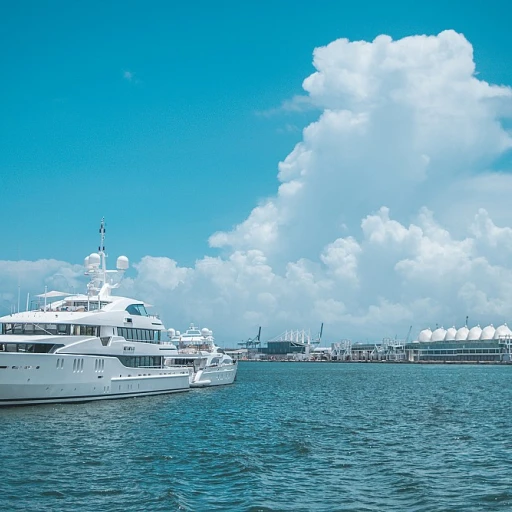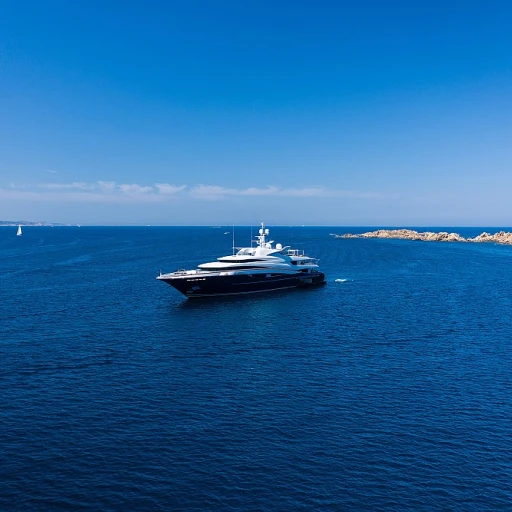-large-teaser.webp)
Understanding the Role of a Yacht Stewardess
The Essence of Being a Yacht Stewardess
Embarking on a career as a yacht stewardess is more than just a job; it’s a lifestyle that many aspire to but few fully understand before they dive in. A stewardess on a yacht wears many hats, primarily focusing on providing impeccable service to guests aboard while ensuring their comfort and safety.
As a part of the yacht crew, a stewardess is responsible for various tasks that contribute to the smooth operation of the yacht's interior. Duties range from managing housekeeping and laundry to delivering top-notch guest services. Each day might involve setting up dining experiences or orchestrating onboard entertainment. While keeping the yacht pristine, stewardesses often coordinate closely with other superyacht crew, including chefs, deckhands, and captains.
The industry demands a blend of service excellence and operational skills. A yacht stewardess needs to be adept at using a VHF radio for communication with other crew and must possess basic safety training, often obtained through STCW (Standards of Training, Certification, and Watchkeeping) basic courses. Such skills are paramount not only for guest service but also for ensuring swift action during emergencies.
The role is fluid and requires adaptability, as tasks can change with each charter or crossing. A successful stewardess must seamlessly transition between roles, utilizing training courses and real-world experience to offer unparalleled service. Investing in training certifications and obtaining an ENG medical certificate underlines a commitment to professionalism and readiness, crucial for a thriving career in the yachting world.
Essential Qualifications and Training
Preparing for Success in Stewardess Training
Embarking on a career as a yacht stewardess requires a combination of training, skills, and certain qualifications to ensure you can handle the demands of life at sea. The yachting industry highly prioritizes safety and quality service, making it essential for aspiring stewardesses to undergo structured training and attain necessary certifications.- STCW Training Courses: The International Convention on Standards of Training, Certification, and Watchkeeping for Seafarers (STCW) is a fundamental requirement. Engaging in these courses will provide you with basic safety, firefighting, and first aid skills that are crucial when working as part of a yacht crew.
- Medical Certifications: A valid medical certificate, often issued by ENG1-approved doctors, is mandatory to ensure you're fit for service. Health is a priority, and this certification asserts your capability to handle life onboard.
- Specialized Skills and Courses: Engaging in additional training specific to a superyacht stewardess, such as silver service, laundry and housekeeping, can be highly advantageous. Specialized courses enhance your ability to provide top-notch service, a key element of the industry.
- MCA Approval: Accreditation from the Maritime and Coastguard Agency ensures your qualifications are recognized globally, bolstering your career prospects in wider superyacht crew roles.
- VHF Radio Licence: Communication plays a significant role aboard a yacht. Obtaining a VHF radio operator certificate enables effective communication — a skill particularly valuable for interior crew management.
Navigating the Job Market
Setting Sail in the Yacht Job Market
Navigating the yacht job market can seem daunting at first, but with the right preparation and approach, aspiring stewardesses can find rewarding opportunities. Start by understanding the dynamic nature of the yacht industry. The demand for superyacht crew, including stewardesses, is ever-evolving and often depends on the season and location. One of the critical steps in entering the market is to complete essential training courses. Ensure you have your STCW basic safety training, which is a mandatory certification for all yacht crew members. Attending a reputed crew academy will not only equip you with vital safety and service skills but also build your proficiency in using VHF radio and achieving other required credentials. An MCA-approved medical certificate is another requirement, ensuring you're fit to work onboard. With these qualifications in hand, registering with yacht crew agencies and online yachting job platforms could open doors to potential job offers. Networking within the yachting community can also provide valuable insights and leads. While seeking positions as a yacht stewardess, consider honing your interpersonal skills and maintaining a positive attitude. These are as important as the technical skills taught during your training. Additionally, aspiring crew members may benefit from exploring opportunities to enhance their yacht experience with entertaining boat accessories, often highly appreciated by guests and fellow crew members. Embarking on a career as a superyacht stewardess involves seizing opportunities and continuously developing your skills. Whether it's through deckhand training or advancing to more specialized roles onboard, the yachting industry offers a multitude of paths for career progression.Life Onboard: What to Expect
Embracing the Reality of Yacht Life
Life onboard a yacht offers a unique blend of luxury and hard work. As a stewardess, you become an integral part of the yacht crew, ensuring the smooth operation of daily activities. Expect your work day to be filled with diverse responsibilities, ranging from immaculate service to guests to maintaining yacht interiors. This environment demands adaptability, discipline, and a profound level of attention to detail.
Understanding the yachting lifestyle is crucial. The superyacht stewardess role can be demanding, often involving long hours and a need for constant readiness. However, the rewards of the job often surpass these challenges, offering the opportunity to work in exotic locations and develop lifelong friendships within the crew.
Key Elements of Daily Duties
Your position as an interior crew member will include thorough cleaning, setting up dining areas, attending to guests' requests, and planning events. Attention to safety is paramount. Thus, stewardess training courses frequently incorporate basic safety and STCW basic skills, equipping you to handle emergencies effectively.
Moreover, the specific requirements of each yacht may vary. Therefore, having a flexible approach to your daily tasks will serve you well. Seasoned superyacht crew members often stress the importance of undergoing comprehensive training certification to better anticipate the diverse needs of yacht operations.
Balancing Work and Leisure
While the hard work of a yacht stew is undeniable, achieving a balance between work and leisure is possible. On days when your service shifts are less intense, immerse yourself in the beauty of the locales you visit. This balance contributes positively to job satisfaction and overall mental well-being.
The industry requires dedication, and the lifestyle might not suit everyone. However, for those passionate about embarking on a unique career path, the yachting world offers unparalleled experiences and opportunities for personal growth.













